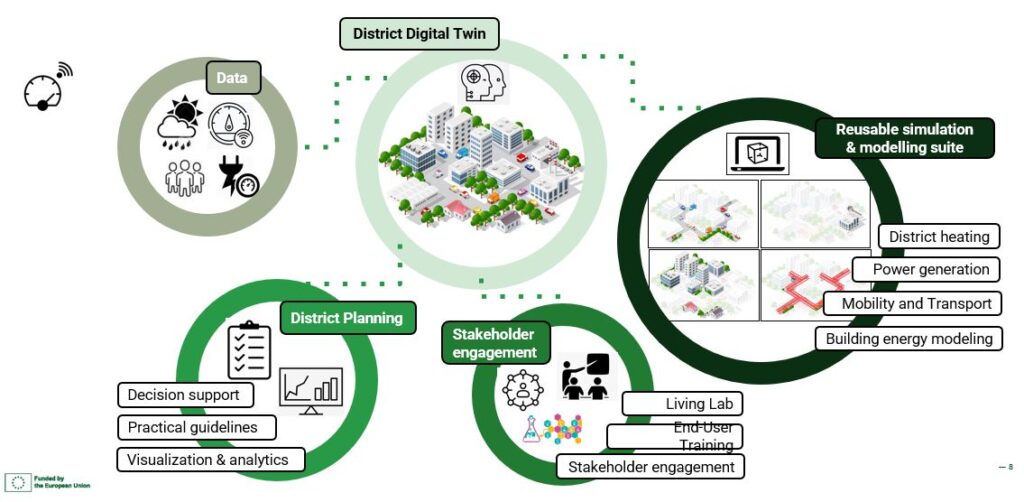The EU Mission Cities initiative aims to support 100 cities to achieve climate neutrality by 2030. Developing Positive Energy Districts (PEDs) is a breakthrough way to deal with the issue of urban emissions and applying adaptation and mitigation strategies to climate change, while ensuring that these urban areas generate an annual surplus of renewable energy and net zero greenhouse gas emissions. The Horizon Europe ExPEDite -project aims to support these actions by developing a digital twin for real-time monitoring, visualization and management of district-level energy flows. (ExPEDite 2024.) Laurea University of Applied Sciences supports the project stakeholder and Living Lab activities and establish ethically sustainable and societally acceptable solutions.

Photo: Dot / Adobe Stock (Laurea Education-licence)
Cities can provide sustainable solutions
European cities play a crucial role in achieving the European Green Deal goal: Climate Neutrality by 2050. Cities take up to 4 % on EU´s land area and they are a home to 75% of EU citizens. Cities account for more than 70 % of global CO2 emissions and consume over 65 % of the world´s energy. (European Commission 2024A.) EU Missions are a new way to bring concreate solutions to wicked problems to support Europe´s transformation into greener, healthier, more inclusive and resilient continent. The idea is to put research and innovation into a new role and combine new forms of governance and collaboration as well as engage European citizens to achieve, for example EU Mission 100 Climate-Neutral and Smart Cities by 2030. (European Commission 2024B.) Mitigating the climate depends on urban action, the EU wants to support cities in accelerating their green and digital transformation. European cities can contribute to the Green Deal target by reducing emissions by 55 % by 2030. (European Commission 2024A.)
Cities can be the key towards sustainable solution. Positive Energy Districts (PED) are opportunities to drive transformation towards climate neutral cities by providing energy-efficient and energy-flexible urban areas or groups of connected buildings which produce net zero greenhouse gases and actively manage local or regional surplus production of renewable energy. PED´s can do this by using energy very efficiently, at the same time being consumers of energy but can also produce renewable energy. (Positive Energy Districts (PED) 2024; What are Positive Energy Districts? 2021.)

Photo 1. Image capture of an example of Positive Energy District from What are Positive Energy Districts? – video (2021).
“Developing Positive Energy Districts (PEDs), is a breakthrough way to deal with the issue of urban emissions and applying adaptation and mitigation strategies to climate change, while ensuring that these urban areas generate an annual surplus of renewable energy and net zero greenhouse gas emissions. PEDs must address environmental, economic and social issues, providing solutions to energy consumption, production, emissions, transport & mobility and livability.” (ExPEDite 2024.)
ExPEDite implementation of PED
ExPEDite project (Enabling Positive Energy Districts through Digital Twin) answers to EU green deal goals by delivering replicable modeling tools, that allow stakeholders to analyze planning actions towards positive energy and climate neutrality in a cost-effective manner. Tools will model e.g. energy production and demand of a district and building stock performance. ExPEDite aims at creating and deploying a novel digital twin, allowing for real-time monitoring, visualization and management of district-level energy flows. (Description of Action 2024.)
The developed digital twin will be applied at Kipsala district in Riga, Latvia. A Living Lab setting at Riga Technical University’s (RTU) campus in Kipsala provides the project to identify and evaluate through a multi-actor participatory approach, the most suitable development pathways and actions to achieve a positive energy performance of the district. (Description of Action 2024.) “Living Labs are open innovation ecosystems in real-life environments based on a systematic user co-creation approach that integrates research and innovation activities in communities and/or multi-stakeholder environments, placing citizens and/or end-users at the centre of the innovation process” (ENoLL 2025). The project will also deliver publication of practical guidelines, reusable models, algorithms, and training materials to aid other cities to replicate the digital twin for their districts, fostering widespread adoption of sustainable energy practices (Description of Action 2024).

Photo 2. ExPEDite project conceptual approach to the District Digital Twin (Expedite project presentation material 2024).
Ethically sustainable and societally acceptable solutions together with stakeholders
In the ExPEDite -project energy is in the core as we attempt to find solutions for the cities to become energy wise more sustainable, resilient, inclusive, and safe. Beside inventing and creating technical solutions, some thoughts are also put to the ethics of both the technology itself and the use of the technology. When aiming the objectives of ExPEDite, a key element is stakeholder engagement. This includes active participation from citizens, energy and urban planners, utility and energy providers, and other stakeholders to align the PED’s operations with social, economic, and environmental goals. Laurea is supporting the related initiatives of the project. For example, during spring 2025 Laurea has co-organised a series of Living Lab workshops to identify relevant stakeholders. This proceeds towards testing in real life environment in autumn 2026. Laurea will co-develop with ExPEDite partners a common methodological approach to set-up, run and monitor participatory research in a Living Lab.
A second role of Laurea is to ensure the ethicality of the project and its outcomes. For example, a crucial question is the environmental impact, notably climate change. As energy production from fossil fuels contributes significantly to greenhouse gas emissions, there is a very ethical responsibility to mitigate climate change for future generations. Our project is committed to contribute to this. Thus, if nothing else, we have a solid ethical justification for our actions.
However, the end does not justify the means. For example, the development of new energy technologies must consider long-term consequences, including possible environmental risks as well as social impacts. Since encouraging sustainable energy use often requires changing consumption habits, it is very important that ethical considerations include respecting cultural values while promoting environmentally friendly practices. Utility and energy providers have a big role in this. They must balance sustainable profit-making with environmental and social responsibility, avoiding greenwashing and ensuring transparency in operations. Also pivotal are questions about the responsibility of governments, corporations, and individuals to reduce energy waste and adopt more sustainable practices. One major question related to above is how to safeguard fair access to clean and affordable energy to all citizens, including low-income households. To address this, ExPEDite is promoting policies and practices that aim to prevent energy inequality.
Albeit being a technology project, ExPEDite has citizens and stakeholder engagement much in the centre of action. This is highly important, since we are creating solutions that incentivise, change, and create new habits and behaviours, and those must be in compliance with legal and ethical requirements. At the end, ExPEDite seeks to bring life to ethically sound energy technologies, policies, and practices, that aim for sustainability, equity, and justice, ensuring that energy production and consumption do not harm people, communities, or the planet.
Writers
Laurea University of Applied Science is leading a task related to ethical, data and legal compliance and contributes to stakeholder engagement, co-creation and Living Lab activities. Tiina Haapanen is Laurea’s project manager for ExPEDite. Tuomas Tammilehto is the ExPEDite project Ethical Manager. Emilia Risu’s role as Service Designer is to support stakeholder engagement and Living Lab activities.
The ExPEDite project is a Research and Innovation action to support the implementation of the Climate Neutral and Smart Cities Mission project and receives funding from the European Union’s Horizon Mission Programme under Grant Agreement No. 101139527
ExPEDite project has 19 partners from 10 countries, including education and research organisations, technology providers, network organisations and consulting agency. The coordinator is Technical University of Riga (RTU).
References
The first image in this article (the feature image) is not licensed under CC BY-SA. It has been used in accordance with the terms of the Adobe Stock Education License and may not be reused or redistributed without separate permission.